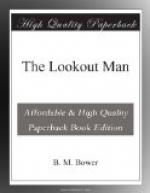“Aw, what’s the use? It’ll come out—it can’t help it. The cops are out there smelling around now, I bet!”
He arose and worked over the car until it shone immaculately. A lifetime of continual nagging over little things, while the big things had been left to adjust themselves, had fixed upon Jack the habit of attending first to his mother’s whims. Mrs. Singleton Corey made it a point to drive her own car. She liked the feeling of power that it gave her, and she loved the flattery of her friends. Therefore, even a murder problem must wait until her automobile was beautifully ready to back out of the garage into a critical world.
Jack gave a sigh of relief when he wiped his hands on the bunch of waste and tossed it into a tin can kept for that purpose. Time was precious to him just now. Any minute might bring the police. Jack did not feel that he was to blame for what had happened, but he realized keenly that he was “in wrong” just the same, and he had no intention of languishing heroically in jail if he could possibly keep out of it.
He hesitated, and finally he went to the house and let himself in through a window whose lock he had “doctored” months ago. His mother would not let him have a key. She believed that being compelled to ring the bell and awaken her put the needful check upon Jack’s habits; that, in trailing downstairs in a silk kimono to receive him and his explanation of his lateness, she was fulfilling her duty as a mother.
Jack nearly always humored her in this delusion, and his explanations were always convincing. But he was not prepared to make any just now. He crawled into the sun parlor, took off his shoes and slipped down the hall and up the stairs to his room. There he rummaged through his closet and got out a khaki outing suit and hurried his person into it. In ten minutes he looked more like an overgrown boy scout than anything else. He took a cased trout rod and fly book, stuffed an extra shirt and all the socks he could find into his canvas creel, slung a pair of wading boots over his shoulder and tiptoed to the door.
There it occurred to him that it wouldn’t be a bad idea to have some money. He went back to his discarded trousers, that lay in a heap on the floor, and by diligent search he collected two silver dollars and a few nickels and dimes and quarters—enough to total two dollars and eighty-five cents. He looked at the meagre fund ruefully, rubbed his free hand over his hair and was reminded of something else. His hair, wavy and trained to lie back from his forehead, made him easily remembered by strangers. He took his comb and dragged the whole heavy mop down over his eyebrows, and parted it in the middle and plastered it down upon his temples, trying to keep the wave out of it.
He looked different when he was through; and when he had pulled a prim, stiff-brimmed, leather-banded sombrero well down toward his nose, he could find the heart to grin at his reflection.




